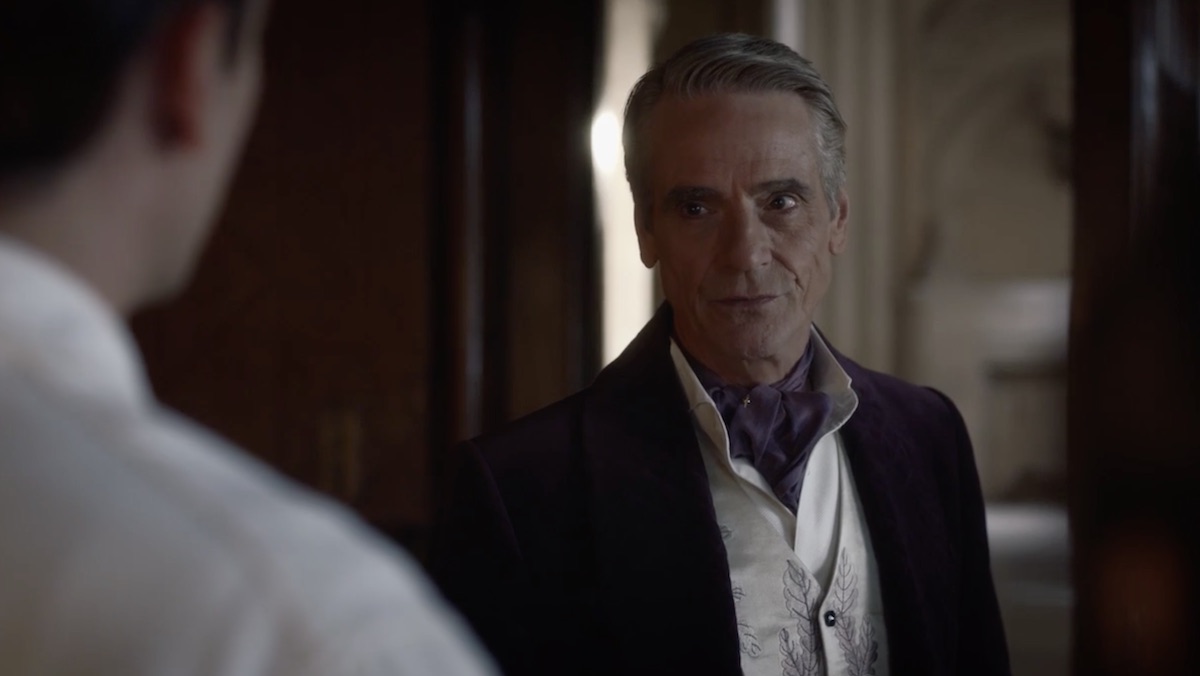Warning: This post contains major spoilers for Watchmen‘s second episode.
We don’t know a lot about Will, but we know he’s definitely not Dr. Manhattan… Almost definitely. That’s the way we’re leaning after Angela told her husband Cal about Will’s claim that Dr. Manhattan can pretend to be human. “No he can’t, and he’s on Mars,” Cal said, a “fact” Angela was completely sure of too. But why should they, or we, believe that?
Why couldn’t Dr. Manhattan—someone who can see through time, simultaneously exist in multiple locations, teleport across galaxies, and bend matter with his thoughts—pass himself off as human? Disguising himself as a regular person doesn’t sound all that challenging for someone with his abilities. And the more confident everyone is that he can’t, the more it raises one monumental question: “Is Dr. Manhattan hiding in plain sight?” If so it’s an ominous sign of just how dangerous things are in the world, and maybe why Adrian Veidt is currently producing a play about Manhattan’s life.
Damon Lindelof’s Watchmen series is a sequel to the graphic novel, and unlike Zack Snyder’s movie, Dr. Manhattan did not become mankind’s greatest threat at the end of the comic book. It was Adrian Veidt’s “alien” squid that united the world in peace against a common enemy. Dr. Manhattan, having rediscovered his compassion for mankind after learning the truth of Silk Spectre’s father, was too late in his efforts to stop Ozymandias, who had blocked Manhattan’s ability to see into the future as part of his master plan.
 HBO
HBO
In his final moments in Watchmen, Dr. Manhattan refused to condone what Veidt did in killing millions to save billions, but he also refused to condemn it. Ultimately the lie had value, and Manhattan killed Rorschach to maintain a peace so many had been sacrificed to gain. Manhattan then told Veidt he was leaving entirely. “Human affairs cannot be my concern,” Manhattan said. “I’m leaving the galaxy for one less complicated.” Thanks to his newly rediscovered interest in human life, Manhattan said he might try and create some life of his own wherever he went.
But right before he left, an uncharacteristically unsure of himself Ozymandias asked Manhattan if he had done the right thing, justifying that “it all worked out in the end.”
“In the end?” Manhattan replied, “Nothing ends, Adrian. Nothing ever ends.” It’s a sentiment Ozymandias has clearly not forgotten, as he echoed those exact words in the show’s second episode. Manhattan’s own self-imposed exile certainly didn’t end his story on Earth. He returned to this galaxy at some point, and now a 24/7 news feed tracks his every movement on Mars.
 HBO
HBO
Just because he’s on Mars doesn’t mean he isn’t somewhere else too at the exact same moment. Manhattan can split himself into multiple beings that coexist in different places. He could be on both Mars and Jupiter at the same time. Or he could be visibly on Mars and secretly on Earth. Since no one thinks he can pretend to be human, no one would even think to look for him, even though he was human before his accident that turned him into a god. He was born Jon Osterman, the man who inspired Veidt’s play.
So what would bring him back? Loneliness? Did Manhattan find (like Adrian Veidt has with his own “dimwit” clones Crookshanks and Philips) that creating life isn’t quite as rewarding as he hoped? We don’t know what happened to Manhattan after 1985, but something has made him interested in human affairs again. And the last time Dr. Manhattan was concerned about humans, a giant squid killed millions in New York City.
Without Adrian Veidt using tachyon generators to send particles into the past to block his vision, Dr. Manhattan can see into the future. How many would have to be in danger now for him to care enough to come back? His mere presence near Earth is equal parts comforting and concerning.
 HBO
HBO
Yet, for as complicated as it is to try interpret the decisions of a god, it’s even harder to guess what the man with the god complex is up to. Even though all of the clues made sense afterwards, no one could have predicted Ozymandias was genetically-engineering an “alien” squid with psychic powers in 1985. No one should be arrogant enough to think they can predict his newest plot now. The best we might hope for is to predict what he still cares about: his life’s work.
Adrian Veidt’s greatest accomplishment was “saving” the world from nuclear holocaust, and to do that he had to emotionally manipulate Dr. Manhattan into leaving Earth entirely. Now, in his secret lair, Veidt’s producing an emotionally manipulative play about Manhattan’s life. And he’s doing it using humans he created, as though he took his final interaction with Manhattan as a personal challenge.
 DC Comics/Dave Gibbons/John Higgins
DC Comics/Dave Gibbons/John Higgins
What does it all mean? What the hell is Ozymandias up to? Adrian Veidt is the smartest man in the world, but we can be confident whatever purpose the tragedy of The Watchmaker’s Son is meant to serve, it’s not about entertaining himself at home. Is he preparing something that will tug on Manhattan’s small sliver of humanity, because once again he has to prevent Manhattan from stopping his scheme? Or does Veidt know something Angela and her husband don’t, that Dr. Manhattan is already back and pretending to be human? Is he hiding in plain sight, ready to save mankind, whether it be from Adrian Veidt or from Veidt’s lie becoming known? It all sounds so crazy, which is why it doesn’t sound crazy at all.
So no, Will probably isn’t Manhattan. But someone might be.
Featured Image: HBO